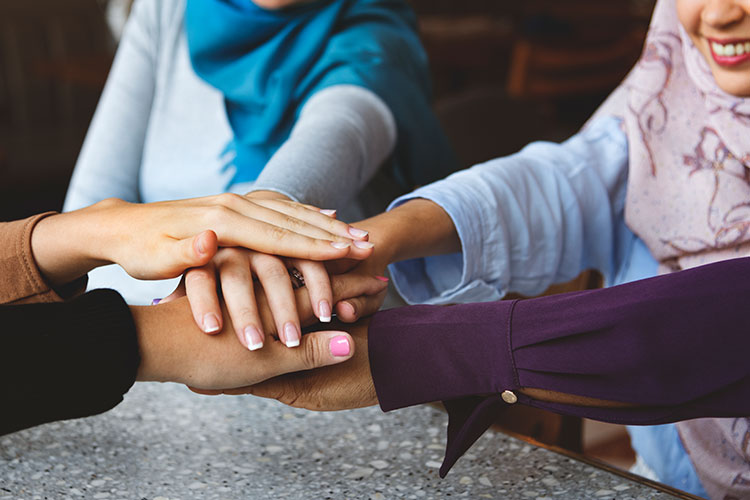Australia’s multicultural identity is its strength, and this is what Harmony Week is all about. A melting pot of customs, languages, beliefs, and cultures doesn’t just enrich social life, it exposes us to diverse perspectives and improves our capacity for tolerance, empathy and open-mindedness.
Diversity is the very infrastructure of The Benevolent Society. Continuously learning about the cultural tapestry of our people, clients and communities is central to what we do.
Why is cultural harmony so vital? Well, according to the Harmony Week government website:
- Nearly half (49%) of Australians were born overseas or with at least one parent who was
- We identify with over 300 ancestries
- Since 1945, more than 7.5 million people have migrated to Australia
- 85% of Australians agree multiculturalism has been good for Australia
- Apart from English, the most common languages spoken in Australia are Mandarin, Arabic, Cantonese, Vietnamese, Italian, Greek, Tagalog/Filipino, Hindi, Spanish and Punjabi
- More than 70 Indigenous languages are spoken in Australia
It’s amazing to think that behind all those statistics there are people with their own, individual stories to tell. To celebrate Harmony Week, we met with Aya Sukkarieh, Senior Child & Family Practitioner for our Family Connect and Support team in the Hunter and Central Coast, NSW.

She’s been with us for four-and-a-half years, providing practice support and coaching to her team and supporting families and/or young people who may be experiencing domestic violence, homelessness, mental health concerns, addiction, or any number of stressors. Aya’s parents migrated to Australia from Lebanon before she was born, and so along with being Australian, she also identifies as Muslim.
Aya believes that Harmony Week is worth celebrating because educating each other on the many diverse cultures in Australia fosters greater acceptance.
“From my experience, I think there’s still a level of covert racism in Australia, most likely stemming from the lack of knowledge and fear,” she explains.
“Harmony Week provides a chance for people to learn about other cultures and religions, address some pre-conceived biases that we may have, and decrease stigma for some cultures in the community. It brings people together, and connection is the best way for communities to create belonging and safety for all.”
She adds that it feels good to be able to embrace her culture and show others the wonderful things about it too.
“I like sharing things about my life with others about and learning about their cultural traditions and ways of life in return,” she says.
When Aya was based in Liverpool, Sydney, she supported many clients from a similar faith or cultural background and found having a shared understanding to be powerful.

“Many clients told me they felt more understood and less scared to bring up their culture in our discussions. It’s a huge part of someone’s identity,” she explains.
Providing cultural consultation to anyone in her team has also been beneficial.
“It really helps to improve our client service delivery and build rapport, which results in better outcomes for our clients. I’m passionate about working with cultural sensitivity, so I love supporting my colleagues as well as learning from others in my team who have a culturally and linguistically diverse background,” Aya says.
Aya shares her traditions
Aya celebrates Ramadan, the holy month of fasting in Islam. During this period of around 30 days, Muslims around the world abstain from food and water from sunrise to sunset.
“It’s a very spiritual month, and the focus is about doing our best to connect with God by doing as much good as we can for ourselves and the community,” Aya explains.
Throughout the month, Aya and her family focus on giving to charity, prayer, spending time with each other and building new habits.

“We learn to control our bad habits, such as expressing our anger negatively, gossiping about others, wasting time and the hope is that we can continue that for the rest of the year,” she says.
There are two Eid celebrations in Islam. The one at the end of Ramadan celebrates the month of fasting and involves waking up early to pray at the mosque, dressing up and visiting family and friends.
“In my family, the day is filled with lots of sweets and coffee, and we usually go out for dinner together. The best part is giving kids presents, lollies, money and watching their reactions!” Aya adds.

The other Eid celebration ‘Eid-ul-Adha’ occurs at the end of the annual pilgrimage to Mecca (Hajj), two-and-a-half months after Ramadan, which carries a lot of religious significance. Again, traditions surrounding food are a highlight.
“My favourite sweet in the Lebanese culture is ‘mamoul’. It’s semolina biscuit stuffed with dates, pistachio or walnut mixes and dusted with icing sugar,” Aya explains. “My family get together the weekend before any Eid and make a huge amount to give to others. It’s one of my favourite things to do before Eid,” she says.
Sharing cultures and traditions with one another shows us how incredibly diverse we all are, and simultaneously makes us recognise how much we all have in common. Happy Harmony Week from all of us at The Benevolent Society.